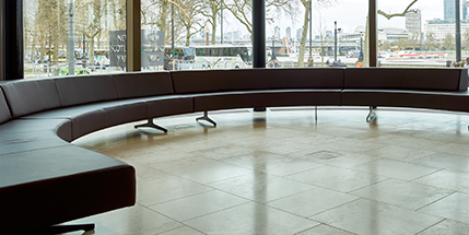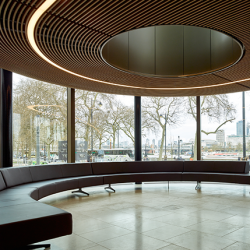October 31, 2017
Boundary-less workplaces must offer contextual, personalised workspaces
 The future workplace will replace familiar, rigid hierarchies and departments with small, collaborative networks of teams and the lines between individual organisations and ecosystems will blur as companies increasingly cast their net wider to innovate. This is one of the predictions made in a Fujitsu-commissioned whitepaper ‘Workplace 2025’ which argues that businesses must rethink social and technology strategies to plan for the future workplace – or risk being left behind. To appeal to future employees with the right skills, the whitepaper, which was produced by European research firm Pierre Audoin Consultants (PAC) advises that businesses must ensure they are moving towards an environment that provides contextual, personalised workspaces aligned to the individual needs of users. At the same time, they should plan to encourage enhanced peer collaboration by implementing technologies such as augmented reality. The Workplace 2025 report foresees that today’s organisational structures will become more agile, adapting to constantly-changing economic conditions, competitive landscapes and customer demands.
The future workplace will replace familiar, rigid hierarchies and departments with small, collaborative networks of teams and the lines between individual organisations and ecosystems will blur as companies increasingly cast their net wider to innovate. This is one of the predictions made in a Fujitsu-commissioned whitepaper ‘Workplace 2025’ which argues that businesses must rethink social and technology strategies to plan for the future workplace – or risk being left behind. To appeal to future employees with the right skills, the whitepaper, which was produced by European research firm Pierre Audoin Consultants (PAC) advises that businesses must ensure they are moving towards an environment that provides contextual, personalised workspaces aligned to the individual needs of users. At the same time, they should plan to encourage enhanced peer collaboration by implementing technologies such as augmented reality. The Workplace 2025 report foresees that today’s organisational structures will become more agile, adapting to constantly-changing economic conditions, competitive landscapes and customer demands.






















 Employees who feel trusted by their employer to manage how and when they work for themselves can improve their levels of productivity, a new survey suggests. The research by Peldon Rose claims that UK workers rate feelings of trust and autonomy from employers and colleagues as increasingly important in keeping them productive and happy in the workplace. But the survey also shows that many employers are failing to provide employees with the resources and support they need to manage their workload and keep them motivated. Although the majority of staff (59 percent) say they work most productively in the office, a third (33 percent) wish they were more trusted to manage how and when they work and 42 percent say that their office does not support a culture that allows them to work flexibly. Despite the clear value that staff place on trust and autonomy, employers are overlooking an opportunity to create a confident and self-motivated workforce.
Employees who feel trusted by their employer to manage how and when they work for themselves can improve their levels of productivity, a new survey suggests. The research by Peldon Rose claims that UK workers rate feelings of trust and autonomy from employers and colleagues as increasingly important in keeping them productive and happy in the workplace. But the survey also shows that many employers are failing to provide employees with the resources and support they need to manage their workload and keep them motivated. Although the majority of staff (59 percent) say they work most productively in the office, a third (33 percent) wish they were more trusted to manage how and when they work and 42 percent say that their office does not support a culture that allows them to work flexibly. Despite the clear value that staff place on trust and autonomy, employers are overlooking an opportunity to create a confident and self-motivated workforce.













November 6, 2017
Time to address the missed opportunities and wasted resources of the modern workplace
by Chris Moriarty • Comment, Wellbeing, Workplace design
More →